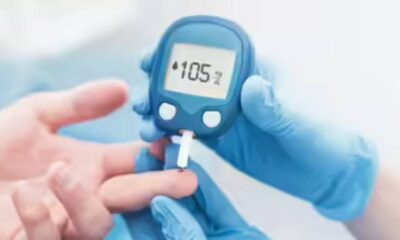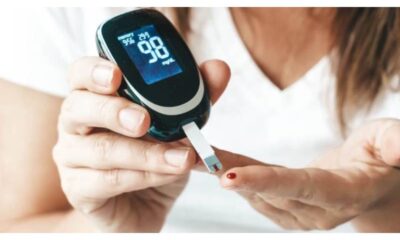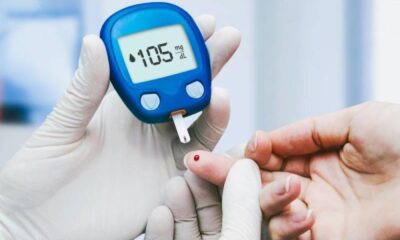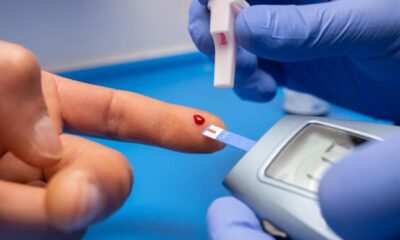Diabetology
Diabetes Medications: Understanding Your Treatment Options
Published
2 years agoon
By
Robert
For people living with diabetes, medication plays a crucial role in managing blood sugar levels and preventing complications. This comprehensive guide delves into the different types of diabetes medications, explores their mechanisms of action, and provides insights into factors your doctor considers when prescribing medication.
Understanding How Diabetes Medications Work
Different types of diabetes medications work in various ways to regulate blood sugar levels:
- Stimulating Insulin Production: These medications, primarily used for Type 2 diabetes, stimulate the pancreas to produce more insulin. Examples include sulfonylureas (glipizide, glimepiride) and meglitinides (repaglinide).
- Sensitizing Cells to Insulin: These medications, also used for Type 2 diabetes, improve the way your body’s cells respond to insulin, allowing them to absorb glucose from the bloodstream more effectively. Examples include thiazolidinediones (pioglitazone) and DPP-4 inhibitors (sitagliptin, linagliptin).
- Delaying Carbohydrate Absorption: These medications slow down the breakdown of carbohydrates in the digestive system, preventing a rapid rise in blood sugar after meals. Examples include alpha-glucosidase inhibitors (acarbose).
- Increasing Kidney Glucose Excretion: These medications, primarily used for Type 2 diabetes, work by causing the kidneys to excrete excess glucose through urine. Examples include SGLT2 inhibitors (dapagliflozin, empagliflozin).
- Replacing or Supplementing Insulin: These medications, essential for Type 1 diabetes and some cases of Type 2 diabetes, provide a source of insulin to mimic the body’s natural insulin production. Examples include rapid-acting insulin (lispro), short-acting insulin (regular insulin), long-acting insulin (glargine), and premixed insulin (combination of rapid and long-acting insulin).
Factors Influencing Medication Choice
Your doctor will consider several factors when choosing the most suitable diabetes medications for you, including:
- Type of Diabetes: The type of diabetes (Type 1 or Type 2) plays a crucial role in medication selection.
- Severity of Blood Sugar Control: The severity of your blood sugar elevations and how well your current lifestyle modifications manage them will influence medication choices.
- Medical History: Existing medical conditions can influence medication selection to avoid potential interactions or complications.
- Lifestyle Factors: Your diet, exercise routine, and overall health will be considered when recommending medications.
- Cost and Insurance Coverage: The cost of medications and your insurance coverage can play a role in determining the best option.
- Side Effects: Potential side effects of each medication will be discussed with you to choose the most tolerable option.
- Your Preferences: Your preferences regarding injection or oral medications, frequency of administration, and ease of use will be considered.
Common Types of Diabetes Medications
Here’s a breakdown of some commonly prescribed diabetes medications:
- Sulfonylureas: These medications stimulate the pancreas to release more insulin. They are typically taken once or twice daily and are often the first-line medication for Type 2 diabetes. However, they can cause hypoglycemia (low blood sugar) and may not be suitable for everyone.
- Metformin: This medication is a staple in Type 2 diabetes management. It helps the body use insulin more effectively and reduces the liver’s production of glucose. Metformin is generally well-tolerated but can cause side effects like nausea and diarrhea, especially when starting the medication.
- DPP-4 Inhibitors: These newer medications work by inhibiting an enzyme that breaks down hormones incretin, which promote insulin release and suppress glucagon (a hormone that raises blood sugar). They are often used in combination with other medications and have a low risk of hypoglycemia.
- SGLT2 Inhibitors: These medications work by blocking the reabsorption of glucose in the kidneys, leading to its excretion in urine. They are effective in lowering blood sugar and offer additional benefits like weight loss and blood pressure reduction. However, they can cause urinary tract infections and are not suitable for everyone.
- GLP-1 Receptor Agonists: These injectable medications mimic the effects of the glucagon-like peptide-1 (GLP-1) hormone, stimulating insulin release, slowing down digestion, and suppressing glucagon secretion. They are effective in lowering blood sugar and promoting weight loss, but they can be expensive and come with side effects like nausea and vomiting.
- Insulin: For people with Type 1 diabetes and some cases of Type 2 diabetes, insulin injections are necessary. Different types of insulin offer varying durations of action, allowing for a customized approach to managing blood sugar levels throughout the day.
Combination Therapies
Often, a combination of medications from different categories is used to achieve optimal blood sugar control. Your doctor will tailor the combination based on your individual needs and response to specific medications.
Taking Your Medications as Prescribed
It’s crucial to take your diabetes medications exactly as prescribed by your doctor. This includes:
- Dosage: Adhere to the prescribed dosage and frequency of medication intake.
- Timing: Take medications at the recommended times, whether before, after, or with meals.
- Consistency: Strive for consistency in taking your medications even when your blood sugar feels under control.
- Missed Doses: Discuss a plan with your doctor for managing missed doses to avoid blood sugar spikes.
Monitoring and Adjusting Medications
Your blood sugar levels will be monitored regularly to assess the effectiveness of your medication regimen. Based on the results, your doctor may need to adjust the dosage or type of medication you’re taking. Open communication with your doctor is essential for optimal medication management.
Potential Side Effects of Diabetes Medications
All medications carry a potential for side effects. Common side effects of diabetes medications can include:
- Hypoglycemia (low blood sugar): This is a potential risk with insulin and some oral medications.
- Gastrointestinal side effects: Nausea, vomiting, diarrhea, or constipation can occur with some medications.
- Weight changes: Some medications may cause weight gain or loss.
- Skin reactions: Injection sites might experience redness, swelling, or itching.
Living with Diabetes Medications
Diabetes medications are a powerful tool for managing your blood sugar and preventing complications. Here are some tips for successful medication use:
- Maintain a Medication List: Keep an updated list of all your medications, including dosages and instructions.
- Carry a Medication Card: Carry a card with your diabetes diagnosis and medication information in case of emergencies.
- Organize Your Medications: Utilize pill organizers or reminder apps to stay on track with your medication schedule.
- Talk to Your Pharmacist: Discuss your medications with your pharmacist and ask any questions you may have.
- Focus on the Benefits: Remind yourself of the positive impact medications have on your health and overall well-being.
The Future of Diabetes Medications
The future of diabetes medications holds promise with ongoing research and development in areas like:
- Long-acting Insulin Analogues: These medications offer extended insulin release for improved blood sugar control.
- Oral Insulin Replacements: Research is underway to develop effective oral insulin medications.
- Smart Insulin Delivery Systems: These systems continuously monitor blood sugar and automatically adjust insulin delivery for personalized management.
Conclusion
Understanding diabetes medications and working closely with your doctor are crucial for effective blood sugar control. By adhering to your medication regimen, monitoring your blood sugar levels, and managing potential side effects, you can optimize your diabetes management journey and live a healthy and fulfilling life.
You may like
-


Daily Routine for Diabetics: A Complete Guide to a Healthy, Balanced Day
-


Morning Routine for Diabetics: Simple Steps to Stabilize Blood Sugar
-


Diabetes and Heart Disease Connection: Early Signs, Risks & Prevention
-


Reversing Type 2 Diabetes: What the Latest Research Says in 2025
-


Diabetes Management: Effective Strategies to Control Blood Sugar Naturally
-


Essential Lifestyle Tips for Preventing Diabetes Complications
The Latest News
- Effect of Physical Activity on Blood Sugar and Diabetes
- High Blood Sugar Symptoms: 10 Common Signs You May Have Diabetes
- Daily Routine for Diabetics: A Complete Guide to a Healthy, Balanced Day
- Morning Routine for Diabetics: Simple Steps to Stabilize Blood Sugar
- Diabetes and Heart Disease Connection: Early Signs, Risks & Prevention
- Reversing Type 2 Diabetes: What the Latest Research Says in 2025
- Best Lifestyle Changes to Lower Stress and Balance Blood Sugar Naturally

Effect of Physical Activity on Blood Sugar and Diabetes

High Blood Sugar Symptoms: 10 Common Signs You May Have Diabetes

Daily Routine for Diabetics: A Complete Guide to a Healthy, Balanced Day

Lung growth invading Treg have different transcriptional profiles and capability connected to designated spot bar reaction

Psoriasis be treatment by adjuvant Salicylic acid, ceramides as this containing lotions



